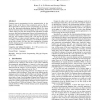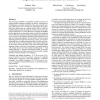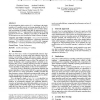124
click to vote
ICFP
2008
ACM
16 years 2 months ago
2008
ACM
Datatype-generic programming involves parametrization by the shape of data, in the form of type constructors such as `list of'. Most approaches to datatype-generic programmin...
ICFP
2008
ACM
16 years 2 months ago
2008
ACM
Earlier studies have introduced a list of high-level evaluation criteria to assess how well a language supports generic programming. Since each language that meets all criteria is...
ICFP
2008
ACM
16 years 2 months ago
2008
ACM
119
click to vote
ICFP
2008
ACM
16 years 2 months ago
2008
ACM
Command-oriented functional programs are currently structured in an ad hoc way that makes the development of multiple userinterfaces difficult and error prone, and makes it diffic...
ICFP
2008
ACM
16 years 2 months ago
2008
ACM
128
click to vote
ICFP
2008
ACM
16 years 2 months ago
2008
ACM
MLF is a type system that seamlessly merges ML-style type inference with System-F polymorphism. We propose a system of graphic (type) constraints that can be used to perform type ...
102
click to vote
ICFP
2008
ACM
16 years 2 months ago
2008
ACM
Existing package and system configuration management tools suffer from an imperative model, where system administration actions such as upgrading packages or changes to system con...
151
click to vote
ICFP
2008
ACM
16 years 2 months ago
2008
ACM
This paper presents a semantic space profiler for parallel functional programs. Building on previous work in sequential profiling, our tools help programmers to relate runtime res...
ICFP
2008
ACM
16 years 2 months ago
2008
ACM
The increasing availability of commodity multicore processors is making parallel computing available to the masses. Traditional parallel languages are largely intended for large-s...
100
click to vote
ICFP
2008
ACM
16 years 2 months ago
2008
ACM
We investigated the relative merits of C++ and Erlang in the implementation of a parallel acoustic ray tracing algorithm for the U.S. Navy. We found a much smaller learning curve ...



